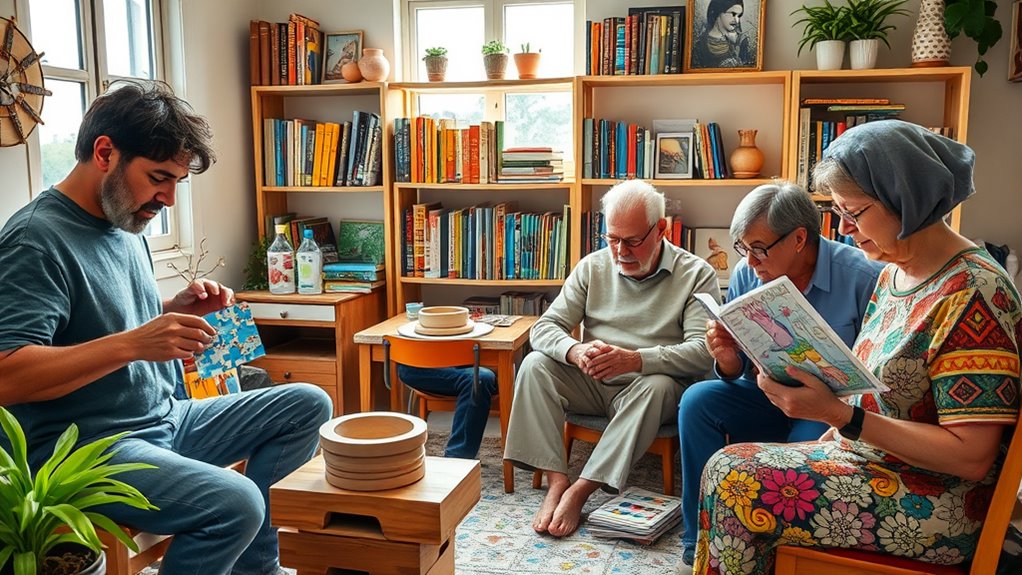You might be surprised to learn that some hobbies can seriously elevate your brain power. Activities like painting, gardening, and even cooking can spark creativity and sharpen your focus. These aren't just fun ways to pass the time; they can actually improve your problem-solving skills and memory. Curious about how each of these hobbies works its magic? Let's investigate the exciting ways to engage your mind!
Painting and Drawing: Unleashing Creativity
When you pick up a brush or pencil, you're not just creating art; you're opening a world of possibilities for your brain.
Painting and drawing can spark your creativity and enhance your mental agility. As you mix colors or sketch outlines, you're engaging different parts of your brain. This helps improve focus and encourages problem-solving skills.
Engaging in painting and drawing stimulates creativity and sharpens focus, activating different areas of your brain for enhanced problem-solving.
Plus, the act of creating can be calming, reducing stress and anxiety. You don't need to be Picasso; just let your imagination flow.
Try doodling during a break or painting a scene that inspires you. You'll find that each stroke or line helps sharpen your mind and relaxes your spirit.
Gardening: Cultivating Patience and Focus
Gardening can be a game-changer for your brain. It's not just about planting seeds; it's about nurturing them. When you dig in the dirt, you learn patience. It takes time to see results, and that's a great lesson. You'll find yourself focused, tuning out distractions as you care for your plants.
Plus, the rhythm of gardening can be calming. Watering, weeding, and pruning give you a sense of routine, which is super helpful for staying on track.
You might even uncover the joy of watching life grow under your care. It's rewarding and can help improve your mood too.
Playing a Musical Instrument: Enhancing Memory and Coordination

Have you ever thought about how playing a musical instrument can energize your brain? It's true! When you strum a guitar or tap a piano key, you're not just making music; you're enhancing your memory and coordination.
Each note you play connects different parts of your brain, improving your cognitive skills. It's like a workout for your mind!
Playing each note activates various brain regions, boosting your cognitive abilities—it's a mental workout like no other!
Plus, it doesn't just help with music. Improved coordination from playing can spill over into daily activities, making you feel more confident.
Whether you're jamming solo or with friends, you're developing focus and discipline. So grab that instrument! It's a fun way to sharpen your brain while enjoying yourself.
You'll be amazed at how much you can grow!
Learning a New Language: Expanding Cognitive Flexibility
Learning a new language can be one of the most exciting adventures you undertake! It's not just about words; it's about opening your mind.
Here's how it enhances your cognitive flexibility:
- Adaptability: You'll learn to switch between languages, improving your ability to think on your feet.
- Problem-Solving: Every new word or phrase is a puzzle. Solving these enhances your critical thinking skills.
- Cultural Understanding: You gain insight into different cultures, making you more empathetic and open-minded.
As you navigate grammar rules and vocabulary, your brain gets a workout. It's like a gym session for your mind!
Cooking and Baking: Boosting Problem-Solving Skills

When you step into the kitchen, you're not just preparing a meal; you're diving into a world of problem-solving. Cooking and baking require you to think on your feet. Ingredients can be like puzzles, and you're the solver. Need to substitute an ingredient? You're strategizing!
Here's a quick look at how cooking can improve your problem-solving skills:
| Scenario | Problem | Solution |
|---|---|---|
| Missing ingredients | You don't have flour | Use oats or almond meal |
| Recipe confusion | Instructions are unclear | Break it down step-by-step |
| Timing issues | Dish needs longer to cook | Multitask with sides |
Frequently Asked Questions
How Do Hobbies Improve Mental Health and Well-Being?
Hobbies improve your mental health by reducing stress, fostering creativity, and providing a sense of accomplishment. Engaging in enjoyable activities helps you connect with others, promotes relaxation, and elevates your general well-being, making life more fulfilling.
Can Hobbies Help Reduce Stress and Anxiety Levels?
Yes, hobbies can greatly reduce stress and anxiety levels. Engaging in enjoyable activities distracts your mind, promotes relaxation, and allows you to express emotions, helping you find balance and peace in your daily life.
What Are Some Low-Cost Hobbies to Boost Brain Power?
Imagine your brain as a muscle; low-cost hobbies like gardening or puzzles strengthen it. They're safe, engaging, and can spark creativity. You'll find joy while sharpening your mind without breaking the bank.
How Much Time Should I Dedicate to These Hobbies Weekly?
You should dedicate at least two to three hours weekly to these hobbies. Consistency is key; spreading it out over several days can help you stay engaged and make the experience more enjoyable and rewarding.
Are There Age Restrictions for Starting These Brain-Boosting Hobbies?
"There's no time like the present." You won't find maturity restrictions for starting these hobbies; anyone can plunge into! Just guarantee you choose activities that match your physical ability and comfort level for safety.









